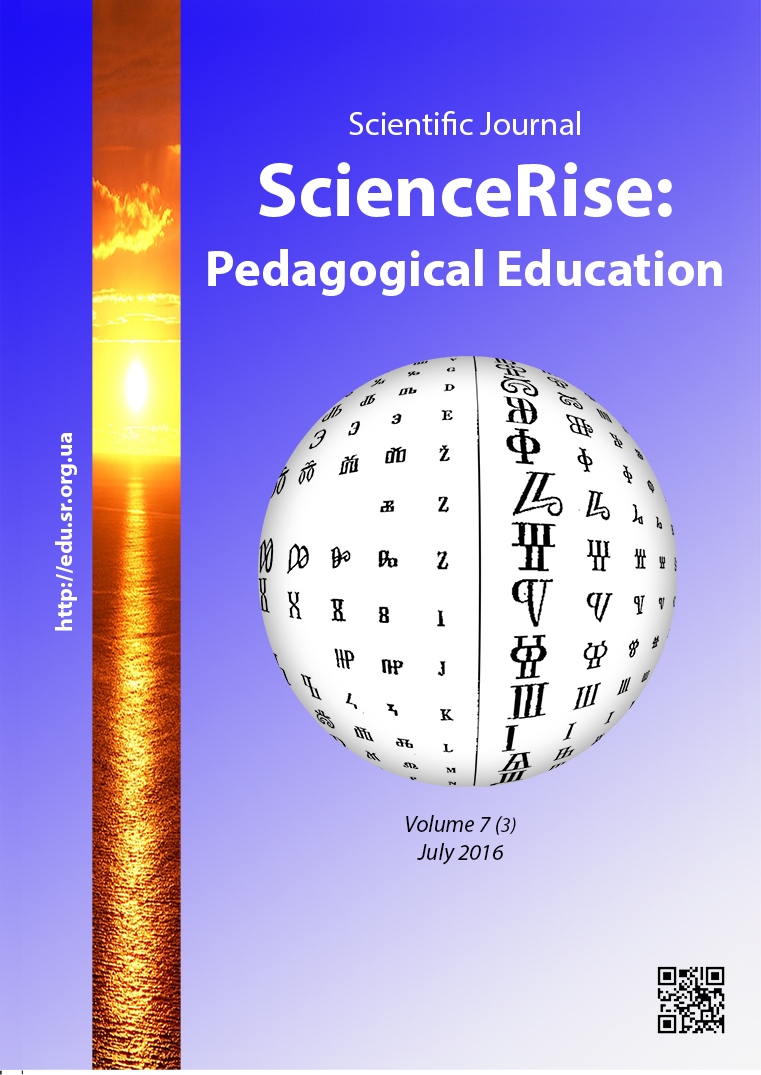Characteristics of adult education in european countries
DOI:
https://doi.org/10.15587/2519-4984.2016.74342Keywords:
lifelong education, education of adults, informal education, professional preparationAbstract
In the article was considered a question of necessity of introduction of the system approach to organization of education of adult population in European space, to choice of optimal ways of the effective professional preparation of the different categories of adults for the diverse directions of qualification advance, determination of criteria of assessment of informal education of adults. There were grounded characteristics of professional training of specialists and unemployed people by the models on examples of Great Britain, Poland. There was determined the role of formal and informal education of adults. Formal education is given by the higher educational institutions – universities, institutions of postgraduate education, polytechnics and colleges. Informal education of adults is provided by the teaching associations, national educational institutions.
There were determined the vectors of modernization of education of adult population: orientation on the real needs of customers (private persons and entrepreneurs); structural transparence and content flexibility of learning programs; multichannel financing; democratization of the system of education of adults by decentralization of managerial authorities.
Conceptual principles of systematization of the prospects of development of education of adults in developed European countries are: determinism of educational policy of aforesaid countries by historical, political, national, socio-economic, cultural factors.
We assign to the prospective directions of further researches: the theory and practice of education of adult population in the context of elaboration of civil society of the global scale; psychological adaptation of adults to the study and/or work in the foreign countries; acknowledge of the results of formal and informal education within international cooperationReferences
- Awszeniuk, N. (2010). Europejski wymair internacjonalizacji ksztalcenia pedagogicznego. Educacja ustawiczna doroslych: kwartalnik naukowo-metodyczny, 4 (71), 14–19.
- Kovalenko, S. M. (2005) Tendentsiyi rozvytku osvity doroslykh v Anhliyi (ostannya chvert' XX – pochatok XXI st.) [Development trends of adult education in England (last quarter of XX - beginning of XXI century)]. Zhytomyr, 235.
- Tovkanets', H. V. (2014). Rozvytok ekonomichnoyi osvity u vyshchiy shkoli Chekhiyi i Slovachchyny u XX stolitti [The development of economic education in high school Czech Republic and Slovakia in the twentieth century]. Kyiv, 515.
- Volyars'ka, O. S. (2015) Profesiyna pidhotovka bezrobitnykh: zarubizhni ta vitchyznyani tendentsiyi [Professional training of the unemployed: foreign and domestic the trend]. Porivnyal'na profesiyna pedahohika, 5 (2), 170–175
- Luk"yanova, L. B. (2014). Adult education in modern Ukrainian academic discourse [Education for Adults in modern Ukrainian the scientific discourse]. Koncepciya akademika Nelli Ny`chkalo u vy`miri profesijnogo rozvy`tku osoby`stosti, 364–371.
- Hryhor"yeva, T. Yu. (2006). Osoblyvosti vykladats'koyi diyal'nosti v navchal'nykh zakladakh dlya doroslykh [Features of teaching in schools for adults]. Suchasni informatsiyni tekhnolohiyi ta innovatsiyni metodyky navchannya u pidhotovtsi fakhivtsiv : metodolohiya, teoriya, dosvid, problemy, 10, 296–299.
- Stelmach, W. (2010). Władza i kierowanie. Teorie i praktyki biurokracji. Warszawa: PLACET, 224.
- Ensuring Basic Skills for Аll. Thematic Report 1. ASEM Lifelong Learning, 2002. Available at: http://www.uvm.dk/asem/reports/asemthe-maticreportl.pdf/
- Global report on adult learning and education (2009. UNESCO Institute for Lifelong Learning, Hamburg.
- Global Employment Trends 2014: Risk of a jobless recovery? (2014). International Labour Office. Geneva: ILO, 126.
Downloads
Published
How to Cite
Issue
Section
License
Copyright (c) 2016 Олена Станіславівна Волярська, Ольга Іванівна Пастушок

This work is licensed under a Creative Commons Attribution 4.0 International License.
Our journal abides by the Creative Commons CC BY copyright rights and permissions for open access journals.
Authors, who are published in this journal, agree to the following conditions:
1. The authors reserve the right to authorship of the work and pass the first publication right of this work to the journal under the terms of a Creative Commons CC BY, which allows others to freely distribute the published research with the obligatory reference to the authors of the original work and the first publication of the work in this journal.
2. The authors have the right to conclude separate supplement agreements that relate to non-exclusive work distribution in the form in which it has been published by the journal (for example, to upload the work to the online storage of the journal or publish it as part of a monograph), provided that the reference to the first publication of the work in this journal is included.








